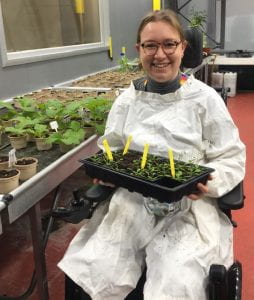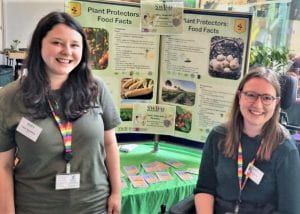- Project: Re-engineering Golgi dynamics in plants – Standard studentship based at Bristol
- Past/current DTP student roles: Student Support Champion for students with disabilities
Tell us a bit about yourself and what attracted you to the SWBio DTP?
 I did my Undergraduate degree at the University of Warwick, and also spent a year at Monash University, Melbourne studying abroad. This was followed by a Masters by Research degree at the University of York.
I did my Undergraduate degree at the University of Warwick, and also spent a year at Monash University, Melbourne studying abroad. This was followed by a Masters by Research degree at the University of York.
I was attracted by the project which I thought was really interesting; the project advertised some techniques which I had experience in, and it seemed a very natural progression.
I was excited to learn some new skills in the taught first year (statistics/coding) which I knew would set me up well for the rest of my PhD. I was also attracted to the programme due to it being a cohort of students.
What has your experience been like so far?
The taught year helped to create a bond within the group. I didn’t have much coding experience, but training was provided in this area and there was support from the group.

Getting stuck into some research
I am the first PhD student to join the SWBio DTP who is a wheelchair user. The Disability Support Service got in contact quite early and we had meetings to discuss what I needed before I arrived. They were very ‘on it’ with discussions about what I might need-I was impressed that they got in touch so far in advance of me starting the course. There were various things which I specifically needed, for example, lab equipment which were put in place. Often these things take time however, so it is good to be proactive about what you might need. My Lab Manager and the Head of Disability Services have been very communicative and are addressing on-going adjustments which have been identified now that I am on site.
Being a disabled student has been difficult at times because there were access issues that couldn’t be pre-empted or solved until I started being on campus day-to-day. Access issues unfortunately required a significant proportion of my time when I first arrived, however I have found that when members of staff became aware of problems, they were often very happy to help and then became advocates for me. I would recommend engaging with disability services early and speaking with your supervisor/colleagues so they can provide help too.

Talking to the public about pest, plants and parasites at the Festival of Nature
As part of the programme, we get to do a 3-month placement (PIPS) at an organisation unrelated to academia. I am really looking forward to the PIPS placement as it is an opportunity to try something new and it can help put your PhD into perspective when thinking about future employment. I am hoping to spend my placement at the Eden Project working as a research writer as part of the Interpretation Team.
Other things on the horizon include being funded for conference attendance, and I’m hoping to go to an International Conference in my third year.
What about the social side of being a SWBio DTP PhD student?
There are various DTP cohort activities which you can get involved with. For example, we had a social activity event at the beginning of the second year which was an Escape Room followed by dinner. There is also an annual student retreat, which I’m looking forward to attending this year.
What would you say to others who are thinking of applying?
I was a bit apprehensive about the application process initially. For example, I was a bit worried by the requirement to have a Maths A level, which I didn’t have. However, I needn’t have worried because I had undertaken courses during my Undergraduate degree which provided me with some statistical training and was recognised as an alternative qualification.
Before I came, I was also quite nervous about the different course components, but it’s really a great opportunity. I would say to people, don’t worry, it’s all doable!
